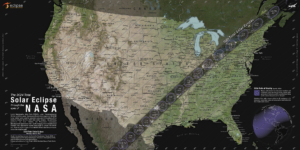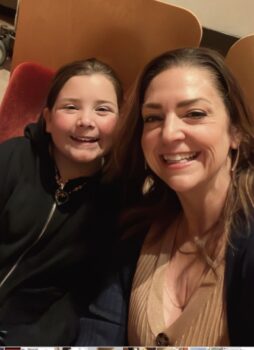What Coloradans need to know ahead of the total eclipse
By Sarah Baines on April 5, 2024
An obstructed view of the sun will be visible to Coloradans Monday, April 8, due to what is being dubbed “The Great North American Eclipse.”
The total eclipse will pass over the United States, moving northeast. After cutting across Mexico, the path of the eclipse will enter the nation through Texas and continue to carve the path of totality over 14 more states: Oklahoma, Arkansas, Missouri, Illinois, Kentucky, Indiana, Ohio, Pennsylvania, New York, Vermont, New Hampshire, Maine and small fractions of Michigan and Tennessee. The route will then continue over Canada.

A solar eclipse occurs when the moon passes between the sun and the Earth. Furthermore, a total solar eclipse materializes when the perceived diameter of the moon is greater than that of the sun, blocking the view of the sun completely from those in the path of totality.
Although Denver will not experience the event in its totality, a partial eclipse will be on view. For the Mile High City specifically, the moon will begin to block the sun at 11:28 a.m. MT, with noticeable coverage at 12:03 p.m. MT. Over half an hour later at 12:40 p.m. MT, the coverage of the sun will peak at 65.3 percent, and the sun will appear in a crescent shape. Shortly before 2 p.m. MT, the eclipse will conclude.
More generally in the Centennial State as a whole, sun coverage will range from 54 to 78 percent, higher in percentage on the eastern side of the state.
For those hoping to view the eclipse as clearly as possible, cloud coverage remains a concern nationwide. According to Weather.com, April 8 will be partially cloudy in Denver.
NASA recommends wearing a set of glasses specifically designed for the eclipse that comply with the ISO 12312-2 international standard. Looking at the event through standard sunglasses, a camera lens, binoculars or a telescope will “instantly cause severe eye injury,” according to the association. Warby Parker and Sonic are among several businesses offering free eclipse glasses.
It’s estimated that 31 million Americans will watch the event. Although 2017 brought the U.S.’s last total eclipse, Mexico hasn’t seen one since 1991 and Canada since 1979. April’s will be the last visible in the contiguous U.S. until 2044.
Mexico’s Torreón, Coahuila, and Nazas, Durango, will experience the longest durations of totality in North America.
Denver starts street sweeping Tuesday: How you can avoid a $50 ticket















